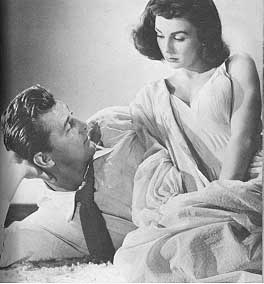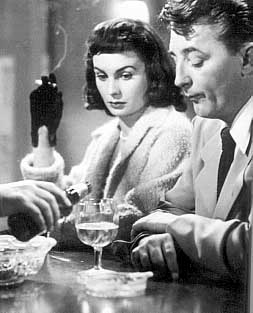Angel Face
(1952, dir. by Otto Preminger)
Sweet little Jean Simmons has the face of an angel, but does she harbor the heart and mind of a killer? That's the theme of this engrossing film noir, where appearances can be deceiving. The beautiful, affluent home Simmons shares with her father (Herbert Marshall), and step-mother (Barbara O'Neil) would appear to be the picture of domesticity, but from the first scene of the film we know something is wrong with this image. An ambulance, sirens wailing full blast, races to the rescue of O'Neil who has nearly died of asphyxiation from the poisonous gas that's been turned on in her bedroom. The gas is turned off in time, but of course the real poison still remains in the house.
 Simmons has a serious daddy-fixation and a most possessive nature when it comes to men. Soon she turns her attention towards ambulance driver Mitchum who at first glance thinks he's calming down an upset young woman, frightened by the near death of her step-mother. But later, even when he recognizes her attempts to manipulate him with ideas of owning his own car shop, Mitchum still can't help but be drawn to her. He is aware Simmons is emasculating him just as her step-mother emasculated her father, but the innocence of her face lures him back every time he attempts to break free.
Simmons has a serious daddy-fixation and a most possessive nature when it comes to men. Soon she turns her attention towards ambulance driver Mitchum who at first glance thinks he's calming down an upset young woman, frightened by the near death of her step-mother. But later, even when he recognizes her attempts to manipulate him with ideas of owning his own car shop, Mitchum still can't help but be drawn to her. He is aware Simmons is emasculating him just as her step-mother emasculated her father, but the innocence of her face lures him back every time he attempts to break free.
Simmons plays her character's dichotomy with mesmerizing ease. There is a haunting quality to her portrayal; she's not a typical one-dimensional femme fatale, hardened and cynical. Yes, she has a very warped and dangerous notion of love, but because of her alluring and almost childlike face, we, just like Mitchum, want to believe in her and even feel a sense of protectiveness towards her, oblivious to the danger this invites.
This film has developed a cult following and it's easy to see why. Subtle, yet powerful performances from a remarkable cast, including supporting actors Mona Freeman and Leon Ames; darkly funny humor; gorgeous and haunting score by Dimitri Tiomkin; crisp, clean direction by Otto Preminger; and rather shocking violence, especially considering when the film was made. A film you want to see again and again.
 Almost as fascinating as the movie itself, is the behind the scenes story of the making of the film. No one, it seems, wanted to do this movie. Producer Howard Hughes had a fixation of his own, on actress Jean Simmons, whom he signed to a three picture contract. He was extremely possessive of her, refusing to loan her out to any studio (causing her to lose the lead in Roman Holiday) and trying to force her into signing a seven year contract. When she balked at signing, the powerful Hughes sent word to the studios stating he had a seven year moral contract with her and she was off limits to them. Simmons and her then husband, Stewart Granger, were appalled and eventually had to take Hughes to trial, where Hughes chickened out of having to testify and settled out of court.
Almost as fascinating as the movie itself, is the behind the scenes story of the making of the film. No one, it seems, wanted to do this movie. Producer Howard Hughes had a fixation of his own, on actress Jean Simmons, whom he signed to a three picture contract. He was extremely possessive of her, refusing to loan her out to any studio (causing her to lose the lead in Roman Holiday) and trying to force her into signing a seven year contract. When she balked at signing, the powerful Hughes sent word to the studios stating he had a seven year moral contract with her and she was off limits to them. Simmons and her then husband, Stewart Granger, were appalled and eventually had to take Hughes to trial, where Hughes chickened out of having to testify and settled out of court.
But he did have one picture left on the original contract and was determined to make Simmons fulfill it. She so loathed the idea of working for him that supposedly she chopped her hair off to spite Hughes so he wouldn't want her in any movie. Didn't work. With 18 days left before her contract expired Hughes contacted Preminger and offered him Angel Face with the assurance of no interference from him. According to Preminger, Hughes said "That bitch, Jean Simmons. All I want is to see the lady wearing a wig of long black hair!"
Mitchum wasn't much interested in doing the movie either. Maybe he was reluctant to work with Otto Preminger, known to be a difficult and tyrannical director. Mitchum, of course, didn't put up with any of the director's abuse, and stuck up for his castmate too. According to Stewart Granger's autobiography, during filming of a scene in which Mitchum slaps Simmons across the face, she told him to really smack her. He did, but "Otto insisted on take after take, and poor Jean's cheek kept getting redder and redder. As Otto insisted on yet another take, Mitchum turned to him and let him have one right across the face. 'Would you like another, Otto?' he said. Otto quickly agreed to print the last take." Way to go, Mitchum! I knew I liked that guy!
Even though the circumstances surrounding the making of this film may have not been ideal, the finished project is a gem and an absolute pleasure to watch.
 Simmons has a serious daddy-fixation and a most possessive nature when it comes to men. Soon she turns her attention towards ambulance driver Mitchum who at first glance thinks he's calming down an upset young woman, frightened by the near death of her step-mother. But later, even when he recognizes her attempts to manipulate him with ideas of owning his own car shop, Mitchum still can't help but be drawn to her. He is aware Simmons is emasculating him just as her step-mother emasculated her father, but the innocence of her face lures him back every time he attempts to break free.
Simmons has a serious daddy-fixation and a most possessive nature when it comes to men. Soon she turns her attention towards ambulance driver Mitchum who at first glance thinks he's calming down an upset young woman, frightened by the near death of her step-mother. But later, even when he recognizes her attempts to manipulate him with ideas of owning his own car shop, Mitchum still can't help but be drawn to her. He is aware Simmons is emasculating him just as her step-mother emasculated her father, but the innocence of her face lures him back every time he attempts to break free.
 Almost as fascinating as the movie itself, is the behind the scenes story of the making of the film. No one, it seems, wanted to do this movie. Producer Howard Hughes had a fixation of his own, on actress Jean Simmons, whom he signed to a three picture contract. He was extremely possessive of her, refusing to loan her out to any studio (causing her to lose the lead in Roman Holiday) and trying to force her into signing a seven year contract. When she balked at signing, the powerful Hughes sent word to the studios stating he had a seven year moral contract with her and she was off limits to them. Simmons and her then husband, Stewart Granger, were appalled and eventually had to take Hughes to trial, where Hughes chickened out of having to testify and settled out of court.
Almost as fascinating as the movie itself, is the behind the scenes story of the making of the film. No one, it seems, wanted to do this movie. Producer Howard Hughes had a fixation of his own, on actress Jean Simmons, whom he signed to a three picture contract. He was extremely possessive of her, refusing to loan her out to any studio (causing her to lose the lead in Roman Holiday) and trying to force her into signing a seven year contract. When she balked at signing, the powerful Hughes sent word to the studios stating he had a seven year moral contract with her and she was off limits to them. Simmons and her then husband, Stewart Granger, were appalled and eventually had to take Hughes to trial, where Hughes chickened out of having to testify and settled out of court.

 Back to Home
Back to Home